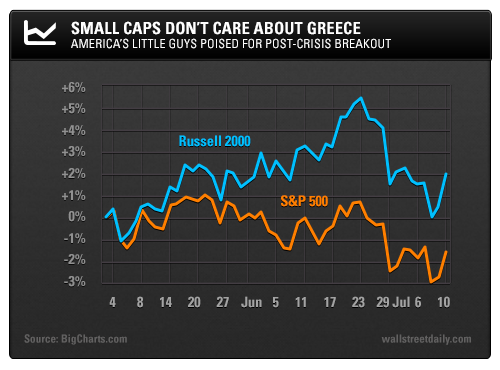Is it end time for the bull market?
Amid the recent bout of volatility, many investors are asking themselves this question, particularly as the crisis in Greece rages on and Chinese stocks get crushed.
Unfortunately, the answer won’t come immediately.
As Ian Bremmer, President of Eurasia Group, tweeted recently, “We’re still not in the endgame for Greece. Plenty of crisis left to play out.”
And Jim Reid, a strategist at Deutsche Bank, shares the same sentiment, telling The Wall Street Journal yesterday that the Greek drama “could in theory stretch out all summer.”
The good news is that when the dust settles, whether it’s this week or next month, a certain asset class appears poised to rally.
And no, it’s not Greek stocks or bonds…
After the Crisis, These Stocks Will Rally
A “manageable contagion.”
That’s how the Financial Times sums up Greece’s default and potential exit from the European Union.
I know… it’s hard to believe. Especially given all the fearmongering in other media outlets.
But let’s put the situation in perspective.
Economically, Greece is totally insignificant to the rest of the world.
The country’s annual GDP of $242.2 billion is roughly equal to the state of Louisiana’s ($257 billion)! So the risks of any major spillover effects are completely overblown.
For investors smart enough not to sell off with the rest of the world, though, here’s an interesting nugget: Before the crisis in Greece hit a crescendo, U.S. small-cap stocks were in the midst of a breakout.
Indeed, from May 1 to June 23, they handily outperformed their large-cap brethren, rising by 6.2% versus a 1.9% climb for the S&P 500.
However, once the Greek firestorm kicked in with a vengeance, the rally fizzled out in a hurry.

But I’m convinced that it’s only a matter of time before the upswing resumes. Why?
Small Caps Stay at Home
For one thing, U.S. small-cap stocks have minimal exposure to Greece. So what happens in Greece doesn’t matter to them.
Heck, even large-cap American companies don’t appear overly concerned about Greece.
Recent analysis by FactSet’s John Butters found that “Greece hasn’t been mentioned in any of the earnings calls conducted by S&P 500 companies during the month of June.”
Instead, countries like Australia (eight mentions), China (seven), Japan (six), India (six), and Canada (six) are causing more concern.
Even if we take a more global perspective, and assume that Greece’s troubles negatively impact other European economies, U.S. small caps are similarly insulated.
That’s because U.S. small-cap companies derive 84% of their sales here at home. By contrast, U.S. large caps generate 62% of sales from North America, according to BlackRock data.
As such, small caps don’t have to worry about overseas economic weakness or a stronger U.S. dollar weighing on results.
There’s another reason why U.S. small caps are poised to rally…
Green Shoots
After a dismal first quarter, during which GDP actually contracted by 0.2%, there are signs of improvement for the U.S. economy.
Enough, in fact, that many economists, including UniCredit’s Harm Bandholz, expect the economy to gain “momentum throughout the summer” and finish the year strongly.
And given what I just said about their heavy exposure to the United States, a strong(er) U.S. economy is undeniably positive for small caps.
“As the domestic economy improves, small caps should disproportionately benefit from their elevated capital spending, balance sheet leverage, and limited international exposure,” says Barclays analyst Venu Krishna.
Bottom line: Forget Greece and focus on finding high-quality opportunities in U.S. small caps. Near-term volatility could create the perfect buying opportunity.
